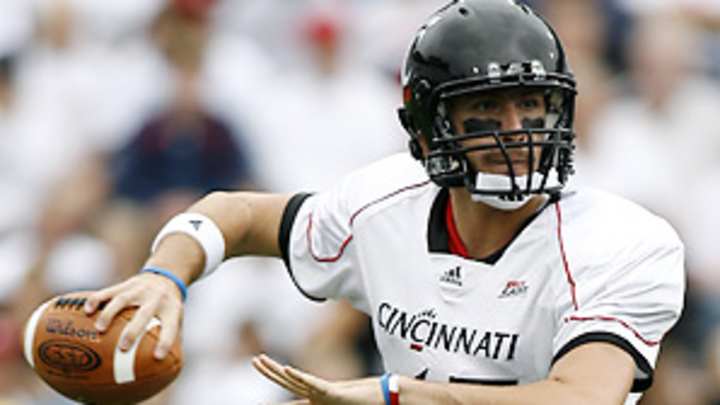Cincy QB's journey from perennial backup to Heisman contender

One weekday in September 2001, Ken Minor, then the varsity coach at Reading (Ohio) High, walked over to watch the freshman team practice. He intended to observe one player, Tony Pike. Twenty years earlier Minor had coached Pike's father, Steve, to a college scholarship from Kent State. Now, he was checking on the younger Pike's progress.
"How's the Pike kid doing?" Minor asked the unit's coach.
"Well, he's running second string right now," said the coach, unhappy with Minor's meddling. "The other boy's better."
Minor made his feelings known. "If you want to keep your job you better put him in the starting lineup," he said. "He's going to be a great quarterback."
Depth charts have rarely been welcoming reads for Pike. Though he saw time at safety that season, he rode the bench as a reserve quarterback his sophomore year. True opportunity did not come until the following August.
Minor had made a habit of starting his backup during the final preseason game. He had also broken form over the summer, installing the spread offense in lieu of the run-based I-formation he employed the previous two decades. Pike took advantage of a system tailor-made for his body-type, completing 28-of-32 passes for more than 300 yards. "Holy cow!" Minor said. "What do we have here?"
Today, the Cincinnati Bearcats know what they have: a Heisman Trophy candidate who will lead them against South Florida in a battle of Big East unbeatens on Thursday night.MANDEL: Can Cincy bring the Big East respect?
Ever since that preseason game, Pike has continued to introduce himself to a widening audience. He shared snaps his junior season, broke his throwing arm on a late hit as a senior after two games, only to return three weeks later. No scholarship offers came to the reed-thin slinger from the Division-I schools, though Miami (Ohio) coaches called regularly to say one was imminent. Toledo eventually offered that winter. So did the Bearcats. Pike's father, who saw his college head coach die of a heart attack at 42 following his freshman season, counseled his son to look past the coaches' pitch for campus comfort. Just get your degree, said the General Electric machinist.
Father's forewarning proved prescient. Cincinnati handed Pike a grayshirt scholarship, which deferred his earliest opportunity to play until the following spring. The next winter, coach Mark D'Antonio departed for Michigan State. In came Brian Kelly, the son of a Boston alderman and a spread offense promoter.DAUGHERTY: Kelly has turned Bearcats into national contender
When new quarterbacks coach Greg Forest and Kelly surveyed the roster of returnees following their International Bowl victory, they noted Pike's promise. His arm was powerful, his strides long. He ran the starting offense for one week that summer, but the staff eventually voted for Wake Forest transfer Ben Mauk -- a surer hand overcoming an arm injury -- to start. "We went with management over arm strength," said Forest, who's been with Kelly 17 years.
Mauk was marvelous, leading the Bearcats to a 10-3 season and throwing for 3,121 yards. Unsure of where he stood afterward, Pike -- a standout baseball and basketball player at Reading -- listened to his father suggest trying out for the baseball team. Smaller colleges in the area whispered that he would be the starter at their programs, but Pike stayed put.
Kelly was not content, though. He demanded renewed commitment, telling Pike that going through the motions to get his diploma would no longer suffice. The 6-foot-6 Pike started the offseason behind four quarterbacks, but rose rapidly. Dustin Grutza won the starting job in camp then broke his right arm in a 52-26 loss to fourth-ranked Oklahoma. Pike pushed the team's no-huddle attack in a 45-20 rout of Miami (Ohio) in Week 3, but his hopes seemed to crash the next game against Akron when he fractured his left forearm. "He's so even keel you wouldn't know whether he was hurting or thrilled," Forest said.
Pins were inserted in his arm. He still wore a cast when he returned three weeks later against UConn. But numbness overtook his throwing hand and he was unable to take the snaps after halftime. The Bearcats lost a 13-10 lead and fell 40-16 on the road.
They recovered the next week. Pike played through the pain, thriving against South Florida's high-pressure pass rush and propelling the Bearcats to a 24-10 upset of the No. 24 Bulls. His quick releases keyed the win. "Can anyone argue that he's not one of the finest quarterbacks in the country?" South Florida coach Jim Leavitt asked. "He displayed uncommon toughness against us to stand in the pocket and made all the throws."
He won all the games, too, and helped Cincinnati earn its first BCS berth, but threw four interceptions in a blowout loss to Virginia Tech in the Orange Bowl.
Pike's not finished breaking through. En route to Cincinnati's game at Miami (Ohio) on Oct. 3, Minor, driving with his wife, almost slowed his car when he saw the latest sign of change.
It was on Route 27 in Ross, Ohio, some 25 miles northwest of Cincinnati. The Fire Department in town had recently raised a billboard touting his former player for the Heisman. "He sure doesn't look like a backup in that image," said Minor, now the coach at nearby Summit Country Day. "Back when his dad was on my team I thought he was going to be my first pro. DeShawn Wynn from the Packers eventually took that title, but Tony looks like he's on the path now."
